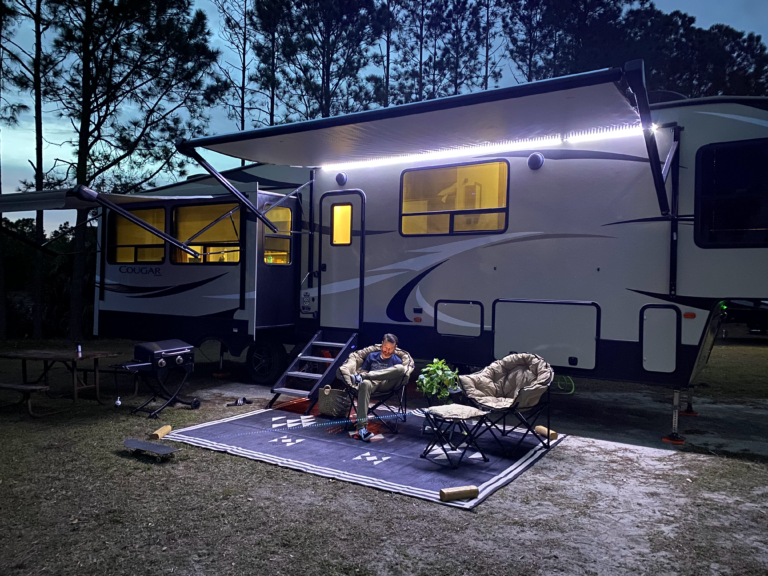
Your RV coach batteries are an essential part of the inner workings of your rig. Without these batteries, many of the luxuries you may take for granted now would no longer run.
Because your coach batteries are such an integral part of a pleasant camping experience, knowing the basics about them is important. This guide is going to address all of the basics and more. Read on, and soon enough you’ll have a nice foundation of RV battery knowledge to work with.
Camper Battery Options
There are four basic options when it comes to trailer and motorhome batteries for the coach. These are listed below, each with a brief description to help you figure out which you have and which would be best for your situation.
- Lightweight lithium-ion (li-Ion) — These batteries have only recently begun hitting the RV market. They are wonderful because they’re maintenance-free and provide an enormous amount of power for their size and weight. That said, they are very expensive, and therefore not the best option for the casual camper, especially if money is a concern.
- Flooded-cell batteries — These are the most commonly used deep-cycle batteries out there. They are filled with distilled water that must be topped up on a regular basis, especially in very hot weather. Additionally, the terminals on these batteries tend to need regular cleaning. These are the cheapest option, but because flooded-cell batteries require so much maintenance, many choose to spend a bit more on another type of battery.
- Gel batteries — Instead of water, these batteries contain a thick gel. This doesn’t spill if the battery happens to be tipped for a short amount of time, and it doesn’t evaporate, meaning the battery does not need to be topped up regularly. Gel batteries cost more than flooded-cell batteries, but they also require less maintenance and last a bit longer.
- AGM RV battery — These batteries also do not require water fill-ups. In fact, the don’t use any liquid at all, meaning they can be mounted sideways if need be. This is great for those who are trying to fit a lot of battery power into a tight space. These batteries are more expensive than both flooded and gel batteries, but they last the longest out of the three.
12-Volt versus 6-Volt RV Battery Guide
After deciding which type of battery to go with, you will need to decide whether you need a couple of 6-volt batteries, a single 12-volt RV battery, or a collection of one type or the other.
Generally speaking, smaller RVs will have one 12-volt battery. Occasionally however, there may be two 12-volt RV coach batteries wired together and in some bigger rigs you’ll find two to four 6-volt batteries wired together to provide 12 volts to the user. That said, you can always make changes to the system your rig was sold with, and many RVers do just that.
If you decide to do this, here are some things you should know. 6-volt batteries are preferred by many because they play better when installed in groups, and because they actually give the best bang for your buck when it comes to storage capacity. However, 6-volt batteries must be installed in pairs.
Prefer to stick with 12-volt batteries? Keep in mind that when 12-volt batteries are used in pairs, they must be wired in parallel. When this is done, the weaker of the two batteries tends to draw from the stronger. For this reason, the batteries should always be replaced in pairs, even when only one of the two is dead.
Battery Ratings
You’ll also want to consider battery ratings. In the case of coach batteries, the rating you’ll want to pay the most attention to is the ampere-hour (Ah) rating. This rating tells you how long a battery can handle a load and will help you determine is you have enough power for your needs. A higher ‘Ah’ rating means a more powerful battery.
RV Maintenance for Your Coach Battery
Just as the rest of your rig needs regular maintenance to stay in tip-top shape, so does your coach battery. Here are the RV battery service steps you should take to keep your batteries working long and strong.
Fill with water — As mentioned before, flooded-cell batteries do need to be topped up with water from time to time. Distilled water must be used in this process, and this bit of maintenance will need to be done more often when it’s hot out. The Flow-Rite system is a great tool to help you ensure your batteries never run out of water.
Clean terminals — Sometimes battery terminals may need to be cleaned in order to ensure they are working properly. This is easy enough to do. Simply mix ¼ cup of baking soda with 1.5 cups of clean water, spray the solution on the terminals, and let it sit for 5 minutes before rinsing with water.
Watch your discharge — You’ll also want to watch your discharge levels. For best results, never let your batteries discharge below 50%. When you do use your batteries, recharge them to 100% as soon as possible. Will you be leaving your rig in storage for a while? A motorhome battery charging system will help preserve your batteries.
Care for your RV battery box — Of course, your battery housing should also be looked after. Ensure your battery box is always in good shape, with no corrosion or other issues.
Best RV Battery
Many people wonder where to find the very best camper battery. Honestly, there is no one-size-fits-all answer to this question, and the battery you choose will need to fit your budget as well as your needs.
Review the information above, and we are certain you will find the perfect battery for you and your rig.

